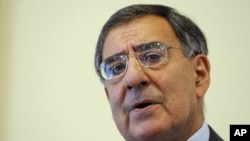Leon Panetta, 73, will become the 23rd U.S. secretary of defense, replacing the retiring Robert Gates on July 1.
Decade of war
The United States has been a nation at war for nearly a decade and the all-volunteer force has been stretched by years of combat. More than 1,500 U.S. troops have been killed in Afghanistan and the war has become increasingly unpopular with the American public.
While a third of the U.S. soldiers in Afghanistan are to be withdrawn by the middle of next year, the new secretary of defense, Leon Panetta, says there is still significant work to be done.
“My first task at DOD [Department of Defense] will be to ensure that we prevail in the conflicts that we are engaged in," Panetta said. "In Afghanistan, we must continue to degrade the Taliban.”
Afghanistan drawdown
Travis Sharp, a military analyst at the Center for a New American Security, says the withdrawal from Afghanistan will be a significant issue facing Panetta.
“And we want to do that quite carefully," cautioned Sharp, "because if the drawdown is not done properly we could sacrifice some of the security gains that we have made in Afghanistan over the last year, thanks in large part to the troops that were added by President Obama.”
Bin Laden raid
Panetta comes to the Pentagon after serving as chief of the CIA, where he supervised the raid that killed al-Qaida leader Osama bin Laden in Pakistan. Panetta has also been a strong supporter of increased drone attacks on al-Qaida and Taliban insurgents based along Pakistan’s border with Afghanistan.
“We are engaged in the most aggressive operations in the history of the CIA in that part of the world and the result is that we are disrupting their leadership,” Panetta said.
Those drone attacks are very unpopular in Pakistan and managing the relationship with Islamabad is another major test for the new defense secretary.
US-Pakistan relations
Analyst Travis Sharp says Panetta will serve as a middleman between the United States and Pakistan.
“It will be a difficult balancing act and I think that there will be many bumps along the way," noted Sharp. "But Panetta’s objective at the outset will be to try to maintain some semblance of a relationship between the United States and Pakistan because quite honestly the countries do need one another if they are going to cooperate and solve the terrorism problem.”
Expected cutbacks
Panetta is a former Democratic Party congressman with extensive budget experience. He was chairman of the House Budget Committee and headed the White House budget office under President Bill Clinton.
American Enterprise Institute senior strategic analyst Gary Schmitt says Panetta’s biggest challenge will be to manage cutbacks in the Pentagon’s huge budget.
“If the administration has its way and there are hundreds of billions of dollars more in cuts, this is going to require significant downsizing of the U.S. military and force structure,” said Schmitt.
Spending shift
President Obama has ordered $400 billion in national security budget cuts during the next 12 years. This will be a major shift after years of larger Pentagon budgets following the September 11, 2001 terrorist attacks on the United States.
Panetta is well aware the days of nearly unlimited defense budgets are over.
“Our challenge will be to design budgets that eliminate wasteful and duplicative spending while protecting those core elements that we absolutely need for our nation’s defense,” he said.
The United States continues to face a large budget deficit and the U.S. military is spending $10 billion a month on the war in Afghanistan.
Analysts like Gary Schmitt say withdrawing troops from two conflicts does cut expenses.
“When you are sitting in the White House and you want to cut the deficit, getting troops out of Iraq and getting troops out of Afghanistan as quickly as you can does make a difference,” Schmitt said.
Panetta is the son of Italian immigrants and he served as a lieutenant in the Army in the 1960s. He and his wife Sylvia own a family farm in Carmel Valley, California.
New US Defense Secretary Panetta Faces Many Challenges




